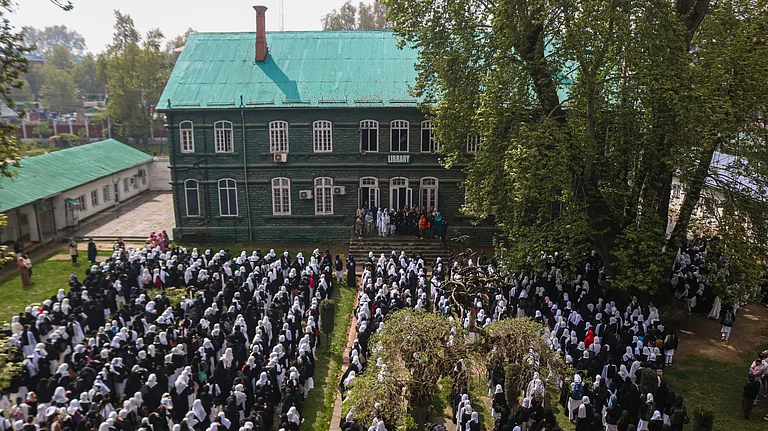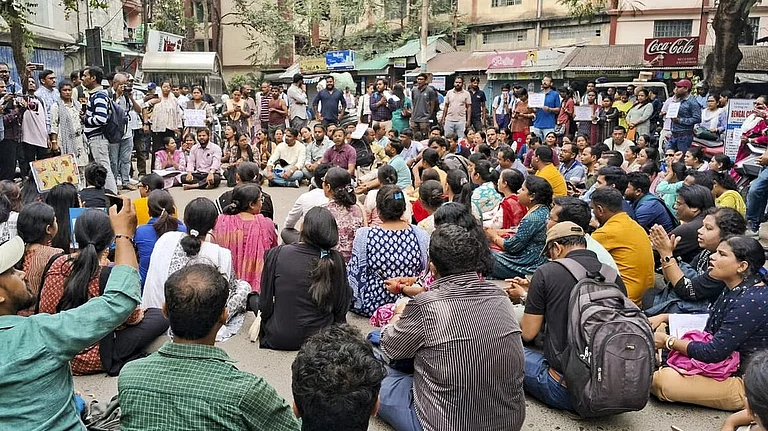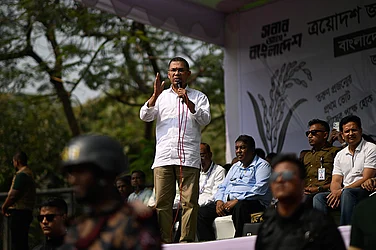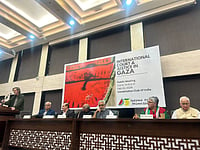“...Below the silence you can make out a piece of sea, of the sea
of pain. I am not his father, but Galip Kurdi is my son.”
Seven years back, the outside of the warehouse at Aspinwall House, Fort Kochi, was transformed into a man-made sea, a tomb to Galip Kurdi. The knee-deep sea waters at the 2016 Kochi-Muziris Biennale invited viewers to wade through the troubled waters of the Mediterranean to read the lines of one of Chile’s most controversial poets, Raul Zurita.
The words of ‘Sea of Pain’ were in memory of five-year-old Galip Kurdi, who has been popularly known as the brother of Alan Kurdi, the three-year-old Syrian child who died in the Mediterranean Sea along with his mother and brother. His body, which washed ashore in September 2015, became a global symbol of the refugee crisis.
Alan and Galip were part of the historic influx of refugees from the Middle East to Europe who wanted to flee the war that was engulfing their country. Like all others, they took the dangerous route and boarded an inflatable boat that capsized in Greece. The incident left behind a stirring image of a dead child -- a face-down body lying near the Turkish resort of Bodrum --- that haunted a time for the longest.
However, neither it was the first, nor was the last. The European waters have never been cordial to the refugees coming mostly from the war-torn Middle East. Nonetheless, nobody ever asked - who waged the war?
On June 15, as a vessel carrying over 700 refugees sank in the Greek waters making it one of the deadliest refugee migrant shipwrecks in the Mediterranean Sea, the haunting question again hits the shores. Who are they? This time, most on board were Pakistani. Dozens hailed from Syria, Egypt and Palestine.
If one looks at the nuanced histories of these countries, one would perhaps tear up Samuel Huntington's clash of civilisation theory. It was not. It has never been. It is the apathy of global leaders that doesn't even let people mourn -- a new wave comes up with the floating dead bodies of new Alans and Galips.
In the words of Zurita-
“When the boat filled with the Syrian immigrants overturned, the father swam from one boy to the other trying in desperation to save them, but he could only see how they disappeared. I wasn’t there. I am not his father….”
Zurita, who has seen bodies being dumped in the sea during the Chilean coup in 1973 paints the sea as a space that divides people from their lands. It is a division that represents pain and suffering of people. It is the space where Alan, Galip, and many others --- who are displaced and separated from their families --- are thrown into the turbulent waters of loss.
Through his poems, he offers no answers. When he puts himself as Galip's father, he just echoes the silenced words of the refugees. An engineer by profession, for Zurita, who has dedicated his life to poetry, it is a must for his poem to engage with humanity -- to see and feel beyond where the eyes meet.
In times of crisis, poetry always plays the role of a documenter. When the words fail to capture the silences of human tragedy; when the numbers can't quantitatively reach the bottom of human hearts; the scattered words are picked up by poets to weave the dreams of a new world.
They also come with an essential purpose -- an indispensable vehicle of advocacy. Zurita’s words do not remember just Alan, but commemorate Galip and the others who die at the shores without getting to see what Henry Van Dyke describes as a "white cloud just where the sea and sky come to mingle with each other".
In an earlier interview with Outlook’s editor Chinki Sinha, Zurita said, “Poetry is like the hand that plunges into you and saves you. Poetry has no power. It cannot change the state of society. It can't stop the armies. But without poetry, there is no hope.” Another Zurita will perhaps emerge at the shores of Greece to document the undocumented- to find the Alans and Galips.


























